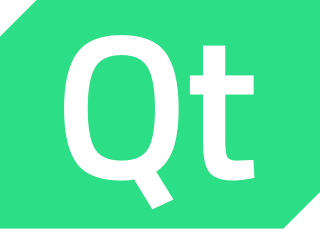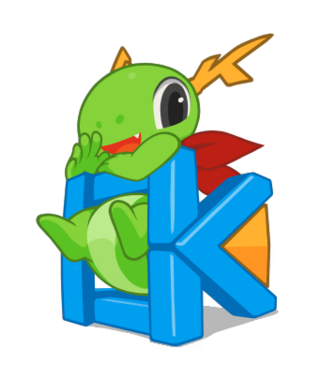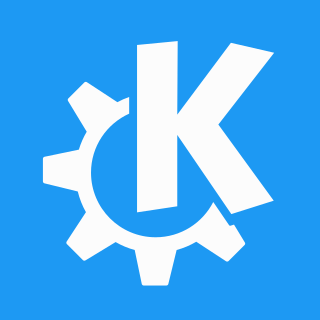
Qt is cross-platform software for creating graphical user interfaces as well as cross-platform applications that run on various software and hardware platforms such as Linux, Windows, macOS, Android or embedded systems with little or no change in the underlying codebase while still being a native application with native capabilities and speed.

In computer science, inter-process communication (IPC), also spelled interprocess communication, are the mechanisms provided by an operating system for processes to manage shared data. Typically, applications can use IPC, categorized as clients and servers, where the client requests data and the server responds to client requests. Many applications are both clients and servers, as commonly seen in distributed computing.
In software engineering, the terms frontend and backend refer to the separation of concerns between the presentation layer (frontend), and the data access layer (backend) of a piece of software, or the physical infrastructure or hardware. In the client–server model, the client is usually considered the frontend and the server is usually considered the backend, even when some presentation work is actually done on the server itself.
aRts is an audio framework that is no longer under development. It was best known for previously being used in K Desktop Environment 2 and 3 to simulate an analog synthesizer.
WebKit is a browser engine developed by Apple and primarily used in its Safari web browser, as well as all web browsers on iOS and iPadOS. WebKit is also used by the PlayStation consoles beginning from the PS3, the Tizen mobile operating systems, the Amazon Kindle e-book reader, Nintendo consoles beginning from the 3DS Internet Browser, and the discontinued BlackBerry Browser. WebKit's C++ application programming interface (API) provides a set of classes to display Web content in windows, and implements browser features such as following links when clicked by the user, managing a back-forward list, and managing a history of pages recently visited.

The KDE Advanced Text Editor, or Kate, is a source code editor developed by the KDE free software community. It has been a part of KDE Software Compilation since version 2.2, which was first released in 2001. Intended for software developers, it features syntax highlighting, code folding, customizable layouts, regular expression support, and extensibility. The text editor's mascot is Kate the Cyber Woodpecker.
The following tables compare general and technical features of notable email client programs.
D-Bus is a message-oriented middleware mechanism that allows communication between multiple processes running concurrently on the same machine. D-Bus was developed as part of the freedesktop.org project, initiated by GNOME developer Havoc Pennington to standardize services provided by Linux desktop environments such as GNOME and KDE.

digiKam is a free and open-source image organizer and tag editor written in C++ using the KDE Frameworks.

KDE Software Compilation 4 was the only series of the so-called KDE Software Compilation, first released in January 2008 and the last release being 4.14.3 released in November 2014. It was the follow-up to K Desktop Environment 3. Following KDE SC 4, the compilation was broken up into basic framework libraries, desktop environment and applications, which are termed KDE Frameworks 5, KDE Plasma 5 and KDE Applications, respectively.

Phonon is the multimedia API provided by KDE and is the standard abstraction for handling multimedia streams within KDE software and also used by several Qt applications.

KDE Platform 4 was a collection of libraries and software frameworks by KDE that served as technological foundation for KDE Software Compilation 4 distributed under the GNU Lesser General Public License (LGPL). KDE Platform 4 was the successor to KDElibs and the predecessor of KDE Frameworks. KDE Platform 4 is the only version of KDE Platform, and in 2013 it was replaced by KDE Frameworks 5.

K Desktop Environment 3 is the third series of releases of the K Desktop Environment. There are six major releases in this series. After the release of KDE 4, version 3.5 was forked into the Trinity Desktop Environment.

The KDE Software Compilation was an umbrella term for the desktop environment plus a range of included applications produced by KDE. From its 1.0 release in July 1998 until the release of version 4.4 in February 2010, the Software Compilation was simply known as KDE, which stood for K Desktop Environment until the rebrand. The then called KDE SC was used from 4.4 onward until the final release 4.14 in July 2014. It consisted of the KDE Plasma 4 desktop and those KDE applications, whose development teams chose to follow the Software Compilation's release schedule. After that, the KDE SC was split into three separate product entities: KDE Plasma, KDE Frameworks and KDE Applications, each with their own independent release schedules.

mlpack is a machine learning software library for C++, built on top of the Armadillo library and the ensmallen numerical optimization library. mlpack has an emphasis on scalability, speed, and ease-of-use. Its aim is to make machine learning possible for novice users by means of a simple, consistent API, while simultaneously exploiting C++ language features to provide maximum performance and maximum flexibility for expert users. Its intended target users are scientists and engineers.

KDE Frameworks is a collection of libraries and software frameworks readily available to any Qt-based software stacks or applications on multiple operating systems. Featuring frequently needed functionality solutions like hardware integration, file format support, additional graphical control elements, plotting functions, and spell checking, the collection serves as technological foundation for KDE Plasma 5 and KDE Gear distributed under the GNU Lesser General Public License (LGPL).

The KDE Gear is a set of applications and supporting libraries that are developed by the KDE community, primarily used on Linux-based operating systems but mostly multiplatform, and released on a common release schedule.

KDE Projects are projects maintained by the KDE community, a group of people developing and advocating free software for everyday use, for example KDE Plasma and KDE Frameworks or applications such as Amarok, Krita or Digikam. There are also non-coding projects like designing the Breeze desktop theme and iconset, which is coordinated by KDE's Visual Design Group. Even non-Qt applications like GCompris, which started as a GTK-based application, or web-based projects like WikiToLearn are officially part of KDE.

Genode is a free and open-source software operating system (OS) framework consisting of a microkernel abstraction layer and a set of user space components. The framework is notable as one of the few open-source operating systems not derived from a proprietary OS, such as Unix. The characteristic design philosophy is that a small trusted computing base is of primary concern in a security-oriented OS.
FastAPI is a modern web framework for building RESTful APIs in Python. It was first released in 2018 and has since quickly gained popularity among developers due to its ease of use, speed and robustness.












